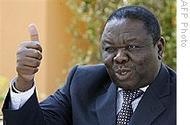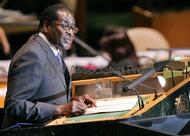VOA标准英语10月-Zimbabwean Economic Crisis Testing Education Syst(在线收听)
Education used to be a top priority for Zimbabwe's government. But as Tendai Maphosa reports from Harare, the country's economic and political crisis is taking a heavy toll on the education system.
Under normal circumstances, junior school children should have started writing their final year examinations this week. But this year is different, the exams will take place at the end of the month.
The Herald daily newspaper, a government mouthpiece, blames the delay on the Zimbabwe Schools Examination Council - also known as ZIMSEC, the body tasked with the organization of examinations. The newspaper describes it as the latest in a series of gaffes by the council.
Ladistous Zunde of the Progressive Teacher's Union of Zimbabwe sees it as just another symptom of a dysfunctional education system. He says the blame lies squarely on the shoulders of the government.
"ZIMSEC is not operating from a vacuum, they cannot operate without funding, they cannot operate without technical assistance and ever since they have been in existence, they have not been able to get enough resources."
Zunde adds that while government seems not to have problems looking after its army and the police, the same cannot be said for teachers. The poor pay they get has led to many strikes.
 |
| Zimbabwean opposition MDC leader and Prime Minister-designate Morgan Tsvangirai at a Harare press conference, 9 Oct. 2008 |
During the violent election campaign earlier this year, he says, teachers were targeted for allegedly supporting the opposition. As a result of that and the poor remuneration, many teachers have left the country, sought alternative employment or simply stayed at home because they cannot afford the commute to work.
Zunde tells VOA even those teachers still working are not sure how much they earn.
"If you look at last month-end - two weeks ago - a primary school was given 12,000, and two days ago was given another 60- to- 90,000 dollars, which really is shameful," he said.
A loaf of bread costs at least 10,000 Zimbabwean dollars. The latest official inflation figure is 231 million percent.
VOA spoke to UNICEF Communication Officer Tsitsi Singizi who says her group has surveyed the Zimbabwe education system and the results are disturbing.
"Trends are indicating that only 40 percent of the teachers are attending lessons, a third of the pupils are not going to school for various reasons - one of them being that teachers are not there - and the exam system is total disarray," she said. "It seems as if the sector is tottering on the brink of collapse and as UNICEF we are really worried."
 |
| President Robert Mugabe at the United Nations, 25 Sept. 2008 |
But Singizi says despite the harsh economic climate and the resultant increase in the dropout rate, Zimbabwean parents will do anything to keep their children in school. She says if the economic decline is arrested, the infrastructure rehabilitated and teachers get fair remuneration the sector could bounce back.
When he came to power in 1980, president Robert Mugabe embarked on a massive exercise to educate Zimbabweans. Schools were built all over the country and teachers were trained to man them. This resulted in Zimbabwe having the highest adult literacy rate in Africa, according to U.N. figures. But that achievement is now at risk.